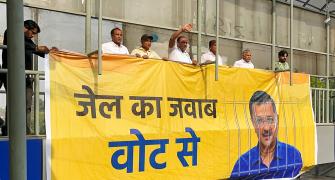The social sector initiatives on health, education and employment promised in the United Progressive Alliance's common minimum programme will put an additional annual burden of at least Rs 12,200 crore (Rs 122 billion) on the Central government's finances.
In its June MacroTrack report, the National Council of Applied Economic Research said increasing the spend in health and education to 8-9 per cent of the gross domestic produce over the next five years would mean an increase of Rs 19,000 crore (Rs 190 billion) to Rs 25,000 crore (Rs 250 billion) for the Central and state governments.
Since education and health are state subjects, the Centre's spend would be restricted. The report said it would be in the range of Rs 4,278 crore (Rs 42.78 billion) to Rs 5,550 crore (Rs 55.50 billion) a year.
The additional burden on central finances because of the employment guarantee scheme would be Rs 34,384 crore (Rs 343.84 billion) over the next five years or 0.25 per cent of the GDP in 2004-05, the think tank said.
According to NCAER, the government should pay special attention to fiscal discipline by controlling expenditure and increasing revenue, in order to honour the promises made in its common minimum programme.
It should carry out comprehensive tax reforms, including the widening of the tax base, tap the services sector further and implement central and state level value-added tax to raise more resources, the report said.
It pointed out that bringing the entire transport sector under the service tax net itself would yield Rs 15,000 crore (Rs 150 billion), which was even greater than the service tax target of Rs 13,000 crore (Rs 130 billion).
While tax road transport can yield Rs 12,800 crore (Rs 128 billion), that on goods carried by rail has the potential of generating an additional Rs 2,200 crore (Rs 22 billion).
On the expenditure front, the government should bring the down the interest rates offered by the provident fund to the market level. While the rate offered is 9.5 per cent, the government earns a return of 7-7.5 per cent.
The government could also consider effective cash management, which would reduce the occurrence of bunching of expenditure at the end of the year, and a reduction in the subsidies it doled out, NCAER said.
The report also indicated that the government would have to restore the confidence of investors in capital markets.
"There is little doubt that the investment climate has worsened after the new government has taken over, more because of its statements than its actions," the report said.
Confusion regarding the Electricity Act, divestment and subsidies has made the investment climate highly uncertain, it has pointed out.
Apart from clearing its stand on these issues, the government should also avoid making arbitrary and frequent changes in the customs duty to improve the investment climate.







